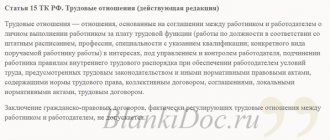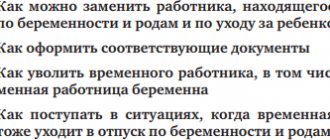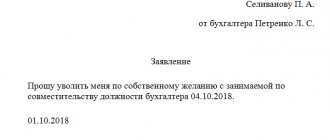Conditions necessary for drawing up an employment contract
An essential feature of an employment contract regulated by the Labor Code of the Russian Federation is the assignment to an individual employee of the obligation to constantly personally perform some very specific labor actions under the conditions created for this by the employer.
This distinguishes it from a civil process agreement, which is regulated by the Civil Code of the Russian Federation and involves the execution by an individual performer at his own peril and risk (with the possibility of involving co-executors) of a specific final task aimed at an agreed result. An employment contract is an agreement concluded between an employee and an employer and contains (Article 57 of the Labor Code of the Russian Federation):
- name of the employee’s job function (position);
- an indication of the place of his work and the conditions under which it will be performed;
- description of the work execution mode;
- condition on the presence or absence of a probationary period;
- data on the amount and terms of salary payment, additional payments for special working conditions;
- information about the date from which the work will begin; if it is not specified, then the obligation to start work arises from the day following the day of signing the contract (Article 61 of the Labor Code of the Russian Federation);
- other points if necessary.
The data included in the employment contract serves as a source of information for issuing an order to hire an employee (Article 68 of the Labor Code of the Russian Federation).
Read about the specifics of issuing such an order in the article.
How to formalize an employment relationship without employment
Labor legislation clearly states: hiring must be accompanied by the conclusion of an agreement with the applicant. However, instead of an employment contract, it is sometimes possible to conclude a GPC agreement.
A civil contract (CLC) is an agreement concluded to perform certain works or provide services.
When drawing up such an agreement, the employer does not make any entries in the employee’s work book. Despite this, all activities prescribed by this agreement to the employee are counted towards the length of service and affect the amount of the pension. It is worth keeping in mind that work under a GPC agreement cannot be indefinite, i.e. its duration depends on the validity period of such an agreement.
A civil law contract always contains the start and end dates for work (services)
Features of concluding a GPC agreement:
- The employer is guided by the norms of the Civil Code when concluding it.
- The parties to the contract are the customer (organization) and the contractor (individual).
- The subject of the contract is the final result of the work or provision of a service, which the employer accepts within the period established by the contract.
- The contract cannot contain instructions on the work schedule, job responsibilities, or compliance with the rules of the enterprise.
When the GPC agreement expires, the contractor must demonstrate the result of his work to the customer. The customer pays the cost of the work performed only after he has drawn up an acceptance certificate for the work performed (services rendered).
The acceptance certificate for completed work is a document reflecting the cost, duration and types of work performed
If it is established in court that the GPC agreement conceals the real labor relationship between the employer and the employee, the norms of the Labor Code of the Russian Federation will be applied to these relationships. This suggests that it is the content of the contract that matters, not its name. In this case, the employer is obliged to re-qualify the GPC agreement as an employment agreement, having drawn up a standard package of documents.
What form does the employment contract take?
An employment contract is concluded in the form of a written document (Article 67 of the Labor Code of the Russian Federation) and is endorsed by both parties participating in the agreement. It is compiled in 2 identical copies intended for each party. On behalf of the employer, it is signed by the employer himself or his authorized representative. The employee signs on the employer's copy upon receipt of his copy of the contract.
If, after signing the employment agreement, some necessary conditions are not reflected in it, this will require changing it by drawing up a bilateral written amendment, which will become an integral part of the agreement.
With an employee who was actually allowed to work before concluding an employment agreement, it is formalized no later than 3 days from the date of the establishment of the employment relationship, if the admission was carried out by a person who has such a right, and the employer has no objections to the conclusion of the agreement (Article 67, 67.1 of the Labor Code RF).
Documents to be presented when applying for a job
In accordance with Art. 65 of the Labor Code of the Russian Federation, it is necessary and sufficient to present:
- passport or other identification document;
- work book (except for situations when an employment contract for an employee is drawn up for the first time or he is accepted as a part-time worker);
ATTENTION! If an employee gets a job for the first time, he does not need to issue a paper work book. All information is recorded in the electronic labor report. Information about the hiring of a part-time worker may not be reflected in the paper work report, but information on the SZV-TD form must be submitted no later than the day following the date of execution of the personnel document on employment.
ConsultantPlus experts explained what to do if an employee, when hired, says that he has lost his work book. Get free demo access to K+ and go to the HR Guide to find out all the details of this procedure.
- Pension Fund insurance certificate (except in cases where the employee does not have this document);
- military registration documents (for those liable for military service);
- documents on education or special training, if confirmation of the necessary qualifications is required;
- certificates of absence or expungement of a criminal record, if the work involves such a restriction.
From 01/01/2017, this list was supplemented with a certificate of non-punishment for drug use, if such confirmation is required for work (Clause 1 of Article 10 of the Federal Law “On Amendments to Certain Legislative Acts of the Russian Federation” dated 07/13/2015 No. 230-FZ ).
In some cases, the law may require the submission of additional documents, such as:
- certificate of medical examination;
- information about income and property;
- work permit for a foreigner.
Labor legislation of the Russian Federation: hiring and dismissal of employees
It happens that people manage to change several jobs until they find one that, along with a decent income, would bring moral satisfaction. Everyone who has already been hired or quit a job has an idea that the process itself requires the provision of certain documents, the execution of employment contracts and orders.
For those who have a long career ahead of them, we will tell you the procedure for hiring and dismissing workers according to the Labor Code of the Russian Federation.
All labor relations that may arise between an employer and a hired worker are regulated by the Labor Code of the Russian Federation (LC RF). Chapters 10 and 11 of the currently valid Labor Code of the Russian Federation cover issues related to the beginning of labor activity and the conclusion of employment contracts, and registration of employment.
Hiring procedure
1. First of all, if there is a vacancy, a potential employee must be familiarized with job responsibilities, the charter of the enterprise, operating hours, and local documents in force in the organization.
2. If the person who wants to get a job is satisfied with everything, he believes that he can cope with the responsibilities, a job application is written to the manager.
3. An employment contract is concluded with the future employee (Article 67 of the Labor Code of the Russian Federation), the document is signed in two copies.
One copy remains in the organization’s HR department, the second is given to the hired employee.
4. Before a new employee begins direct work duties, he must be familiarized with the safety rules, instructions for labor protection in the workplace and fire safety rules against signature in special magazines.
5. According to Art. 68 of the Labor Code of the Russian Federation, no later than 3 days from the actual start of work, an order for employment must be issued and the newly hired employee must be familiarized with it against his personal signature.
To apply for a job, you must submit the following documents (Article 65 of the Labor Code of the Russian Federation):
- citizen's passport;
- work book (if you have previously worked officially);
- pension insurance policy;
- educational documents;
- military ID for those liable for military service and persons of conscription age; military registration documents.
In some cases, it is possible to provide additional documents.
6. Based on the order, a record of employment is made indicating the position and date of admission.
A personal card is created in the HR department to record changes and additions made to the work book.
What entries should be made in the work book?
The work book is filled out in accordance with Instruction No. 69, approved on October 10, 2003.
A work book is a document that reflects a person’s entire work activity.
On the first page, the employee’s personal data is entered, that is, last name, first name, patronymic, date of birth and information about education. If the surname is changed, a note is made with reference to the document on the basis of which the new one was given.
All changes related to the work are made in the book itself:
- employment records, indicating the name of the organization, job title, date of admission and order number;
- in cases of transfer of an employee to another position, this must also be reflected on the basis of an order and indicating the date;
- the dismissal must be recorded similarly to the wording of the dismissal order and comply with the norms of a specific article of the Labor Code of the Russian Federation, indicating its part, clause, number.
The date and number of the dismissal order are also indicated.
The record is certified by the signatures of the person responsible for maintaining work books, the inspector of the personnel department and the head of the enterprise, and is secured with the seal of the organization.
There should be no abbreviations when filling out.
If an entry is made in error, a note is made below to consider it invalid.
Disciplinary sanctions in the form of comments and reprimands are not included in the work book, while incentives for work and awards of certificates must be reflected.
If a person works part-time, if he wishes, an entry about this can also be made at his main place of work by providing the relevant documents (copies of the order for part-time employment and also, upon dismissal, an extract from the order).
An important point is that if, upon hiring, an employee of the HR department is given five days to make entries in the work book, then upon dismissal it must be filled out on the same day and handed over to the dismissed employee.
If you don’t have a work book?
In the case when a person gets a job for the first time, and he never had a work book, or it was lost under various circumstances (burned out in a fire, lost during a move, a bag with documents was stolen, etc.), this cannot be an obstacle for hiring.
They have no right to refuse employment due to lack of a work book.
According to Art. 65 of the Labor Code of the Russian Federation, he must be issued a new work book at the enterprise upon his application addressed to the manager, indicating the reason for its absence.
So, the employee worked for the employer’s organization for more than 5 days. What's next?
According to Article 66 of the Labor Code of the Russian Federation, an employee who has worked for more than 5 days must have all employment documents drawn up, an entry in the work book and a similar entry in the personal card created for the new employee in the T-2 form.
The newly hired employee must personally sign that he is familiar with the changes made to the work book.
An employment contract with an employee must be drawn up no later than three days after the latter actually starts work.
According to Art. 57 of the Labor Code of the Russian Federation, a labor agreement must be concluded between the employer and the employee, in which the employer undertakes to provide work and appropriate remuneration, provision of conditions for the performance of labor duties, and the employee undertakes to perform his job functions, not to violate the work schedule, and the rules established in the organization.
According to Art. 67 of the Labor Code of the Russian Federation, an employment contract must be drawn up in writing within three days from the moment the employee has already started working.
If, after the newly hired employee has already begun to perform his job duties, the contract was not signed by both parties, in fact it is considered concluded from the first day of work.
What other legal actions must the employer take?
As we have already mentioned, before allowing a person to work, he must be familiar with:
- with job responsibilities;
- with the internal regulations of the organization;
- with the charter of the enterprise and its operating mode;
- with local documents valid for the enterprise (collective agreement, for example);
- instructions: on labor protection, work safety and fire safety.
Dismissal of employees
An employment relationship with an employer can be terminated for three main reasons:
- at the request of the employee himself (Article 77 of the Labor Code of the Russian Federation);
- at the initiative of the employer (Article 81 of the Labor Code of the Russian Federation);
- and for reasons beyond their control (in case of liquidation, reorganization of the enterprise or reduction in the number and staff of employees), in accordance with paragraphs 1, 2 of Art. 81 Labor Code of the Russian Federation.
Dismissal procedure
1. If an employee himself wishes to terminate the employment contract, he writes a statement addressed to the manager of his own free will, taking into account the fact that, according to the provisions of Art. 80 of the Labor Code of the Russian Federation, he will be fired two weeks after registering the application.
Based on labor legislation, an employee must notify the manager at least 14 days in advance of his desire to resign. This time is needed so that a replacement can be found and, in some cases, documents and files can be transferred.
In addition, the person who wrote the application can also change his decision during these two weeks and continue to work.
Dismissal is possible without work, on the day the employee indicates in the application:
- upon reaching retirement age and retiring;
- if it is necessary to move to another area, in connection with the transfer of one of the spouses;
- upon admission to full-time study at higher or special educational institutions;
- upon reaching an oral agreement with the manager or concluding an agreement;
- upon expiration of the concluded employment contract;
- and in other cases when there are good reasons, documented, that the employee can no longer work, or there are norms of Federal laws that are not taken into account in the Labor Code of the Russian Federation.
You will also not have to work for two weeks if the resignation letter is written together with an application for leave with subsequent dismissal, or while already on it, when there are more than two weeks left before the end.
2. At the initiative of the head of the enterprise, an employee will be dismissed in the following cases:
- gross violation of labor discipline;
- inconsistency with the position occupied, identified during the workplace certification process;
- repeated detection of failure to fulfill labor duties, if there have already been disciplinary sanctions, verbal or written;
- in case of loss of trust;
- violations of labor protection requirements;
- and other reasons specified in Art. 81 Labor Code of the Russian Federation.
In all these cases, there must be documented facts. These include reports from the immediate supervisors of the departments where the employee works, minutes of the meeting of the certification commission and explanatory notes regarding violations from the employee himself.
3. For independent reasons, that is, in the event of liquidation of an enterprise, reorganization, reduction of staff and number of employees, first of all, the employee must be warned 2 months in advance about the changes and upcoming dismissal.
If there are vacancies, a transfer to a new position should be offered.
If the transfer is refused, the person is fired with severance pay.
4. In all cases, the person is given a bypass sheet, which, after being signed by all services, he submits to the HR department.
5. An order for dismissal is being prepared with justification and reference to current labor legislation.
6. An entry on dismissal is entered into the work book in accordance with the norms of the Labor Code of the Russian Federation and indicating the article, date and number of the dismissal order.
7. All changes are entered into the employee’s personal card.
8. On the last working day, documents and a full cash settlement of the amounts due for payment are issued.
Mutual settlements between employee and employer
Upon termination of the employment relationship, the dismissed employee must be familiarized with the order against personal signature. In case of refusal to sign, an act of familiarization with its contents is drawn up.
The employee must sign the bypass sheet and submit it to the HR department for calculation of pay. He must also hand over all the documentation in his possession and hand over the workstations in proper form.
The employer is obliged to make a full settlement with the dismissed employee on the last day, regardless of the reasons for termination of the employment contract.
A person should receive:
- the required salary for the time actually worked;
- in case of remaining days of unused vacation - monetary compensation;
- in cases provided by law - severance pay.
The dismissed employee must be given the following:
- employment history;
- certificate of average salary for the opportunity to register with the employment center;
- salary certificate for the last two years for accrual of sick leave;
- upon request of the employee, copies of orders for hiring and dismissal are issued.
What if the employee does not show up to collect his work book?
For delay in issuing a work book:
- the administration of the enterprise may be held administratively liable;
- or, according to the claims of the dismissed employee, a sum of money in the amount of the average salary for all days of delay will be recovered from the organization.
If the employee does not show up for the work book, he must be sent a registered letter with notification. The letter should ask you to come for documents in person, or give written consent to send them by mail. In this case, the HR department inspector relieves himself (and the enterprise) of responsibility for the work book not being issued on time when paying. The receipt of the letter by the addressee is reflected in the postal notification.
Guarantees when drawing up an employment contract
The conclusion of an employment contract is accompanied by a number of guarantees (Article 64 of the Labor Code of the Russian Federation):
- its registration cannot be refused without sufficient grounds;
- refusal to conclude an employment relationship due to pregnancy or the presence of children, as well as for other reasons not related to the employee’s business qualities is prohibited;
- there is an obligation to draw up an agreement no later than 1 month from the date of dismissal from his previous job if the employee is transferred to the employer at his written invitation;
- if there is a written request, the employer must, no later than 7 working days, notify in writing the person who received the refusal to employ him, the reasons for this refusal;
- the employee has the right to appeal the refusal of employment in court.
In the guide to personnel issues from ConsultantPlus you will find step-by-step instructions with expert explanations on applying for a job. If you do not have access to the K+ system, get a trial online access for free.
Step-by-step instruction
On September 21, the Organization entered into an employment contract with V.O. Tikhomirov. An employee was hired as a driver in the Garage division with a salary of 46,000 rubles. with a 2-month probationary period. Work is the main thing for him.
On the day of the appointment, the employee wrote an application for a standard personal income tax deduction for the first child under 18 years of age.
Step-by-step instructions for creating an example. PDF
| date | Debit | Credit | Accounting amount | Amount NU | the name of the operation | Documents (reports) in 1C | |
| Dt | CT | ||||||
| Hiring an employee | |||||||
| September 21 | — | — | — | The order of acceptance to work | Recruitment | ||





